Settling in Calgary
Gateway presents an opportunity to become better connected for the benefit of newcomers.
I. Important Immigration Documents
Confirmation of Permanent Residence (COPR)
Your Confirmation of Permanent Residence (COPR) is your original record of immigration. Please keep in mind the following points about your COPR:
- An immigration officer has signed and dated it.
- The information is correct and complete.
- Keep it in a safe place for life long.
(1) If you find incorrect information or if any information is missing on the document after landing, you may request to fix the mistakes. Please contact the Immigration, Refugees and Citizenship Canada (IRCC) call center at 1-888-242-2100 or visit IRCC Request to Amend COPR.
(2) If you lost your COPR, please fill out the Verification of Status form to replace your document. To download the form and instructions, please visit IRCC: Verification of Status.
Permanent Resident Card (PR Card)
After landing, your first permanent resident card (PR card) will be mailed to you. There are a few things you need to know:
- Please prepare a Canadian address at the time of landing for PR card delivery.
- Your PR card is official proof that you are a permanent resident of Canada.
- It is a travel document. You need to show a valid PR card when returning to Canada from another country.
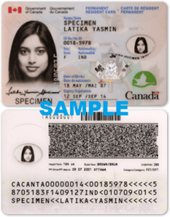
The processing time for the first PR card is available on IRCC’s website.
- If you find a mistake on the PR card, please contact IRCC as soon as possible. You may request for IRCC to reissue a PR card within 180 days of your landing. For more information, please visit IRCC: Request to Reissue.
- The PR card is valid for 5 years. If your PR card is damaged, stolen, about to expire, or has expired, you may apply for a new card. For more information, please visit IRCC: PR Application.
II. Finding a Place to Live
Rent an apartment or house
- Here are several websites where you can find information on available rental properties:
- When renting a property, you may be asked to pay for the cost of utilities, such as water, heat, and electricity. Sometimes, the cost of utilities is included in the rent. To open an account for the utilities, please call 3-1-1 or 4-1-1 to ask for the contacts of service providers.
- If you have a problem with the landlord, read the rules in the Residential Tenancy Dispute Resolution Service (RTDRS). For more information, please visit information for tenants.
Look for a motel, hotel, or shelter
- To look for a hostel in Calgary, you can visit com
- To look for a hotel or motel in Calgary, please call 1-800-252-3782 (toll free) or visit Travel Alberta.
- ‘Inn from the Cold’ provides emergency shelter for homeless children and their families. For more information, please visit Inn from the Cold. You can also find shelters and learn more about shelters in Alberta here.
III. Social Insurance Number (SIN)
Apply for a SIN
For most newcomers, the SIN is the first document to apply for. Visit a Service Canada office to apply. To look for office locations and application details, please visit Service Canada – Apply for a SIN
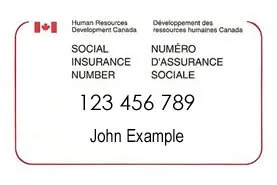
Protect your SIN
Your SIN is important personal information. To learn about how to protect your SIN, please visit Service Canada-Protect My SIN
IV. Health Care
You can apply for the Alberta Health Care Insurance Plan (AHCIP) after arriving in Alberta if you are eligible. Basic medical needs are covered under the insurance, but there are medical services that are not covered.
Alberta Health Care Insurance Plan (AHCIP)
New immigrants can apply for the AHCIP at a registry office. You must provide supporting documents that prove:
- Alberta residency (such as a rental agreement)
- Identity (such as a passport)
- legal entitlement to be in and remain in Canada (such as a permanent resident card or confirmation document or letter)
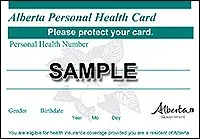
- To learn more about the ACHIP and the application process, please visit AHCIP
- To learn about which medical services are covered and which are not covered under the AHCIP, please visit
3. To look for a registry office location, please visit Registry Office
Health Services
- Family doctors assist in all areas of your and your family’s health. To learn how a family doctor can help, please visit Choosing a Family Doctor
To search for a family doctor in your area, please visit these links:
- https://albertafindadoctor.ca/
- https://search.cpsa.ca/
- https://www.albertahealthservices.ca/info/Page13253.aspx
- If you don’t have a family doctor, you can use a walk-in clinic. These clinics don’t require an appointment and are staffed with family doctors. Some are open for extended hours during evenings and weekends. To search for a walk-in clinic location, please visit Walk-in Clinic
- Urgent Care Centers have extended opening hours during evenings and weekends for unexpected and non-life-threatening health concerns which require immediate treatment. To look for more information about Urgent Care Centers, please visit Search Urgent Care Centers
- Call 9-1-1 to access emergency medical services or go directly to the nearest emergency department. For emergency department locations and updated wait times, please visit Emergency Medical Services
- Community Health Centers provide health services, such as pre-natal and post-natal programs and vaccinations for babies and young children. For more information, please visit Community Health Centre
- Prescription drugs are available at pharmacies. You need to pay for prescription drugs unless you have benefits that cover the expense. Pharmacists give instructions on dosage and how to store the drugs properly. Pharmacists can also give advice on over-the-counter medication and natural health products. For more information about how a pharmacist can help, please visit AHS-Pharmacistand AB College of Pharmacists
- Health Link is a 24/7 toll free hotline in Alberta. By calling them, you may ask a registered nurse for medical advice over the phone. Interpretation services in up to 120 languages are available. Dial 811 to call Health Link. For more information, please visit Health Link Alberta
- If you are interested in learning about Alberta’s Ministry of Health, please visit Ministry of Health
Health Benefits
The Government of Alberta provides extended health care benefits for low-income families to cover their medical needs.
- Alberta Adult Health Benefit (AAHB) helps Albertans with low-income to pay for prescription drugs, dental services, optical services, emergency ambulance, and diabetic supplies. Pregnant women or individuals with high ongoing prescription drug needs living on low income can register for the benefit. For more information, please visit AAHB
- Alberta Child Health Benefit (ACHB) is an extended health benefit provided to help children (under the age of 18 or still attending grade 12) from low-income homes. For more information, please visit ACHB
V. Language Improvement
Improving your English language skills can help you be engaged with your community, find a job, or attend occupational training. Most English language training programs follow Canadian Language Benchmarks (CLB). The first step is to take an English test to know your CLB.
Language Assessment
The Calgary Language Assessment & Referral Centre (CLARC) is funded by the government and provides free language tests to immigrants and refugees. Listening, speaking, reading, and writing are all assessed. For more information, please visit English Testing & Classes
Language Improvement Programs
After you have your English test results, you can identify the program that best serves your needs. Here are two options for improving your English:
- Language Instruction to Newcomers of Canada (LINC) is funded by the Government of Canada and is free of charge for permanent residents and refugees. You can choose a full-time or part-time program. For the LINC Program directory in Calgary, please visit Language Program Directory
- English as a Second Language (ESL) programs provide language training from basic to advanced language skills. The program is not funded by the federal government, but some programs provide funding assistance. For an ESL program directory in Calgary, please visit
VI. School Registration & Finding a Daycare
School registration
If you have a school aged child, you need to have them registered with a school board after landing. There are two school boards in Calgary: the Calgary Board of Education (CBE) and the Calgary Catholic School District (CCSD). Both school boards provide education to students from kindergarten to grade 12.
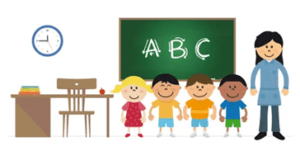
1. For the Calgary Board of Education (CBE) Kingsland Reception Centre contact information, and to find more information about registration, please visit CBE-School Registration
- For more information about Calgary Board of Education programs, please visit CBE-Program Options
2. For Calgary Catholic School District (CCSD) St. John Reception Centre’scontact information and to learn about the registration process and documents required to register, please visit
Daycare services
Daycare services are provided to children under school age. Out-of-school care programs are available for children attending Grades K-6. Each program charges a certain amount of fees. Parents are responsible for paying for these childcare services.
- To search for a quality childcare service, please visit AHS-Child Care Lookup
- The Government of Alberta provides financial assistance to parents who have low income and need childcare services for valid reasons, such as looking for jobs, studying or working. For more information, please visit AHS-Child Care Subsidy
VII. Public Transportation/Transit
Calgary Transit public transportation
You can ride a bus or the C-train to travel around the city. A ticket or a pass is required to use the public transit system. A ticket is valid for 90 minutes for transferring between buses and C-trains in any direction. A pass will allow you to use the transit system as much as you need to for the day or month printed on the pass. Adult and youth Day Passes are only available for purchase at ticket vending machines at all CTrain stations. Seventh Avenue in downtown is a free fare zone. You do not need a ticket or a pass to use the C-train in that zone.
Visit and browse following site to see how you can get to all the attractions on public transit: Calgary Transit – Home Page
Getting a driver’s license
- You can go to a registry office to get a driver’s license. The Government of Alberta has a Graduated Driver Licensing (GDL) policy. A new driver needs to pass a written test for Stage One. In Stage Two, you must pass the basic road test to receive a probationary license. There is an advanced road test and other requirements that drivers must pass to receive a full license.
- For more information about GDL, please visit: Get a driver’s licence | Alberta.ca
- For more information about driving safety, driving knowledge and to prepare to write the test, please visit: Driver guides | Alberta.ca
- The Government of Alberta has established policies for exchanging driver’s license and for GDL program exemption for new immigrants and Alberta residents. For more information, please visit: Graduated Driver Licensing (GDL) exemption user guide – Open Government (alberta.ca)
Buying a used car
If you plan to buy a used car, careful shopping, research and some common sense on vehicles is required. It is a good idea to shop with someone who is knowledgeable about vehicles. Alberta Transportation has provided some information about tools to check used car prices and advice on car inspections, mechanical fitness assessment and making final decisions. For more information, please visit: Buying a used vehicle in Alberta | Alberta.ca
VIII. Finance
Money and banking
It is a good idea to learn about Canadian currency, exchanging foreign money to Canadian currency, sending money to Canada, and opening a bank account.
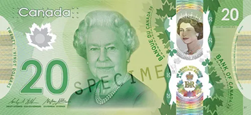
Image source: Bank of Canada
To open a bank account, you usually need to go to a bank and provide an acceptable form of identification.
Immigration, Refugees and Citizenship Canada has prepared related information for new immigrants. For detailed information, please visit
Taxes in Canada
Tax and benefit related information is available at Canada Revenue Agency (CRA) website. You can learn about the Canadian tax system, child and family benefits, filing an income tax return, the community volunteer income tax program, and other related information. For details, please visit: CRA- Individuals and Families
IX. Job Searching
Job Searching
There are non-profit-organizations that provide employment preparation programs to help internationally educated professionals with job searching. For detailed information, please visit
Employment, Training and Career Services Directory:
http://www.humanservices.alberta.ca/services-near-you/2433.html
and the employment resources on our platform employment resources: Start Here – Immigrant Services Calgary
X. Government Benefits & Community Resources
There are resources in communities where individuals and families can get information and support.
Government benefits
- GST/HST Credit is a tax-free quarterly payment made to eligible individuals or families. If you are a resident of Canada for income tax purposes and 19 years of age or older, you may be eligible for the GST/HST credit.
New residents of Canada can apply for the GST/HST credit by completing the Application for Individuals Who Become Residents of Canada( Form RC151, GST/HST Credit Application for Individuals Who Become Residents of Canada) for the year that they become a resident of Canada.
For more information please visit CRA-GST/HST Credit
2. Canada Child Benefit (CCB) is a tax-free monthly payment made to eligible families to help them with the cost of raising children under the age of 18. If you are a resident of Canada for income tax purposes and primarily responsible for the care of your children under the age of 18, you may be eligible for the benefit. New immigrants or Returning Residents of Canada need to fill out and sign “Canada Child Benefit Application” formand include “Status in Canada/Statement of Income” form (RC66 Canada Child Benefits Application includes federal, provincial, and territorial programs – Canada.ca) with their application. The completed application forms and supporting documents proving the immigration status and proof of birth for each child should be mailed to the tax centre corresponding to the province of residence.
For more information, please visit Overview of child and family benefits – Canada.ca
3. Employment Insurance (EI) is a temporary financial assistance to unemployed Canadians and permanent residents who have lost their job through no fault of their own while they look for work or upgrade their skills. The individual needs to have worked enough insurable hours to be eligible for EI. Canadians who are sick, pregnant, caring for a newborn or adopted child, caring for a family member who is seriously ill with a significant risk of death, or caring for their critically ill or injured child may be assisted by Employment Insurance. For more information, please visit: Service Canada – Canada.ca
4. Alberta Child and Family Benefit | Alberta.ca (ACB) is a non-taxable amount paid to lower-income families in Alberta with children under 18 years of age. ACB payments are made quarterly in August, November, February and May. Families need to file income tax return to receive the benefit, but there is no working income requirement. For more information, please visit ACB
5. Alberta Family Employment Tax Credit (AFETC) is a tax-free amount paid to families in Alberta that have working income and children under 18 years of age. You need to file income tax return and there is a minimum working income requirement to be eligible for the benefit. Payments are made in July and January. For more information, please visit AFETC
6. Alberta Child Health Benefit (ACHB) provides health benefit coverage for children under 18, and 18-19 year old dependents living at home and attending school. The intent is to ensure that children from lower income families have equal access to extended medical services. For more information, please visit: Alberta Child Health Benefit | Alberta.ca
7. Alberta Adult Health Benefit (AAHB) provides support to low-income Albertans who are pregnant or have high ongoing prescription drug needs. The intent is to ensure that eligible adults have access to prescription drugs, dental services, optical services, emergency ambulance and diabetic supplie For more information, please visit:
8. The Calgary Board of Education waives school fees for low-income Qualified parents/guardians can also apply for waiver of Transportation Fees, Music Instrument Rental Fees and Lunch Supervision Fees. For Fee Waiver application forms and more information, please visit: Central Fee Waiver – Fees & Waivers – CBE
9. Calgary residents in financial need can apply for Calgary Transit Low Income Transit The purchase price will be assigned based on a sliding scale pricing system. Applicants are required to submit Fair Entry application form and provide proof of address and household income. For more information, please visit: Low Income Monthly Pass (calgarytransit.com)
10. City of Calgary Recreation Fee Assistance Program offers low income Calgarians subsidized access to facilities that are registered with the City of Calgary and other programs offered by the Fee Assistance Partners.
Community resources
- Community Resource Centers can provide you with resources, referrals, information and support. They assist individuals and families in accessing resources such as food, clothing, housing, employment and transportation.
- Calgary Public Library has 21 branches around the city. The library provides extensive programs for all ages, such as ESL conversation classes, reading clubs, computer literacy programs, and career seminars. For more information, please visit: CPL
- Calgary Food Bank provides emergency food hampers to individuals or families who are not able to afford food. Eligible people may receive up to seven emergency food hampers in a 12-month period. For more information, please visit: Calgary Food Bank
- Good Food Box (GFB) is a program from where you can buy fresh fruits and vegetables at a very low cost. There are several locations in different communities where orders can be placed and the food boxes can be picked up. For more information, please visit: Community Kitchen Program-Good Food Box
- Making Changes Employment Association of Alberta provides programs, services and resources to empower women in transitionovercome barriers to employment. Two of their programs provide business attire for women and clothing for teenaged girls (ages 12-18) from lower income familie For more information, please visit: Making Changes (makingchangesassociation.ca)
- Women in Need Society (WINS) is a charitable organization that runs thrift stores at several locations in the city. Women coming out of crisis situations, transitioning to housing, newcomers to Canada or those who have fallen on difficult times can access free goods, such as clothes, household items, and furniture for themselves and their families through the Free Goods Referral Program (FGRP). For more information, please visit: Women In Need Society | Supporting Vulnerable Women & Their Children (winsyyc.ca)
XI. Immigrant Serving Agencies & Ethno-Cultural Groups
You can receive free services from immigrant-serving agencies to meet new immigrant’s needs, such as finding a job, language assessments and classes, finding a place to live, and filling out forms and applications. First language services are available in most cases. There are also ethno-cultural groups in Calgary that provide support and services to the communities.
Immigrant Serving Agencies
Ethno-Cultural Groups
- ACTIONDIGNITY
- AFRIKADEY! ARTS & CULTURE SOCIETY
- ALLIANCE FRANCAISE DE CALGARY
- ALLIANCE JEUNESSE-FAMILLE DE L’ ALBERTA SOCIETY (AJFAS)
- AMERICAN HISTORICAL SOCIETY OF GERMANS FROM RUSSIA –CALGARY CHAPTER
- ASIAN HERITAGE FOUNDATION
- BRAZILIAN COMMUNITY ASSOCIATION OF ALBERTA
- BENGALI ASSOCIATION OF CALGARY
- CALGARY BULGARIAN SOCIETY
- CALGARY CHINESE CULTURAL CENTRE
- CALGARY ETHIOPIAN COMMUNITY ASSOCIATION (CECA)
- CALGARY FINLANDIA CULTURAL ASSOCIATION
- CALGARY JAPANESE COMMUNITY ASSOCIATION – NIKKEI CENTRE
- CALGARY JEWISH COMMUNITY CENTER
- CARIBBEAN COMMUNITY COUNCIL of CALGARY
- CENTRE D’ACCUEIL POUR LES NOUVEAUX ARRIVANTS FRANCOPHONES
- COUNCIL OF SIKH ORGANIZATIONS (COSO)
- CROATIAN CANADIAN CULTURAL CENTRE
- CZECH and SLOVAK ASSOCIATION of CANADA- Calgary Branch
- DIVERSECITIES
- DUTCH CANADIAN CLUB of CALGARY
- HAITI ASSOCIATION OF CALGARY
- HELLENIC COMMUNITY OF CALGARY
- HUNGARIAN-CANADIAN CULTURAL ASSOCIATION OF CALGARY
- IGBO CULTURAL ASSOCIATION OF CALGARY
- IRANIAN CULTURAL SOCIETY of CALGARY
- IRISH CULTURAL SOCIETY
- JAMAICAN CANADIAN ASSOCIATION ALBERTA (JCAA)
- JEWISH FAMILY SERVICE CALGARY
- KOREAN CONVERSATION CLUB
- MALAYSIAN SINGAPOREAN BRUNEIAN COMMUNITY ASSOCIATION
- MUSLIM FAMILIES NETWORK SOCIETY (MFNS)
- MUSLIM RESOURCE CENTRE FOR SOCIAL SUPPORT AND INTEGRATION
- NIGERIAN CANADIAN ASSOCIATION of CALGARY
- PHILIPPINE CULTURAL CENTRE FOUNDATION OF CALGARY
- POLISH CANADIAN ASSOCIATION OF CALGARY
- ROMANIAN CANADIAN CULTURAL ASSOCIATION OF CALGARY
- VENEZUELAN – CANADIAN ASSOCIATION of CALGARY
- UKRAINIAN CONGRESS CALGARY